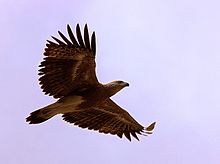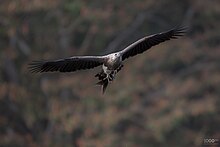| Lesser fish eagle | |
|---|---|

| |
| Conservation status | |
 Near Threatened (IUCN 3.1) | |
| CITES Appendix II (CITES) | |
| Scientific classification | |
| Domain: | Eukaryota |
| Kingdom: | Animalia |
| Phylum: | Chordata |
| Class: | Aves |
| Order: | Accipitriformes |
| Family: | Accipitridae |
| Genus: | Icthyophaga |
| Species: | I. humilis |
| Binomial name | |
| Icthyophaga humilis (Müller & Schlegel, 1841) | |
| Subspecies | |
| |
| Synonyms | |
|
Ichthyophaga humilis | |


The lesser fish eagle (Icthyophaga humilis) is a species of Icthyophaga found in the Indian subcontinent, primarily in the foothills of the Himalayas, and south-east Asia. There are records from Gujarat, Central India and in more recent times from the Kaveri river valley in southern India, although the south Indian records are now thought to come from an isolated population, disjunct from the species' normal range. Some taxonomic authorities place this species in the monotypic genus Icthyophaga. Others place it in the genus Haliaeetus.
Lesser fish eagles are fish-eating birds that have feet adapted to aid in gripping slippery fish. They have strongly curved talons, and spicules along the underside of the birds' toes help to grip fish as they pull them from the water.
There are two subspecies: Icthyophaga humilis humilis, which is native to the Malaysian Peninsula, Sumatra, Borneo, and Sulawesi; and Icthyophaga humilis plumbeus, which is native to Kashmir through southeast India, Nepal, and Burma towards Indochina.
Description


The lesser fish eagle is a medium-sized bird of prey that is primarily gray-brown in colour with broad, blunt wings and coarse featherless legs. They are smaller than the similar Icthyophaga ichthyaetus (grey-headed fish eagle) and may often get confused with the similar species. The lesser fish eagle has a brown breast with white thighs and belly. They have a short, rounded tail with a long neck and a small head. Juvenile lesser fish eagles are similar in appearance to adults, although they have brown eyes whereas an adult has yellow. Adults have a wingspan reaching 1.2 m and can grow to up to 64 centimeters tall.
Diet and feeding habits
The lesser fish eagle feeds primarily on fish, which it snatches from the water as it observes them from above on a perch, which may be an overhanging tree or rock in the middle of a stream. They have several personal perches that they often switch between throughout their feeding time. As their diet is primarily fish, lesser fish eagles have large, curved talons specialized for catching fish and taking them from the water.
Habitat
They inhabit various forms of rivers, lakes, and wetlands and are seen most often along hill streams and fast moving water. They have been known to reach heights up to 2,400 m, but usually create their habitats below 1,000 m. Some specific eagles have been recorded to reach heights exceeding 4,000 m in Nepal.
Range
The lesser fish eagle has been known to live in India and the Kashmir region, spanning eastward into Nepal, China, and other parts of Southeast Asia. In India, they are restricted to the Himalayan foothills and move north-eastern. Adults move south of the Himalayan mountain ranges, but remain partial and altitudinal in the Himalayas throughout the year. They have been known to live in a variety of widespread locations such as Bangladesh and Nepal, to Cambodia, Indonesia, and Vietnam. Researchers believe that there are 1,000 to 10,000 individuals. The numbers of the lesser fish eagle are in decline for various reasons such as habitat loss, human disturbance, as well as hunting and nest robbery. They have recently been listed as Near Threatened by BirdLife International.
Reproduction
Although incubation and fledging periods are unknown, the breeding season in the lesser fish eagle begins in March and ends in August for those in Northern India and Nepal, but in other areas, may begin in November and end in April. Roughly 2-4 eggs are laid in a clutch, and their nests consist of sticks and green leaves. After enough use, the nest may reach 1 m across and up to 1.5 m deep.
References
- BirdLife International (2012). "Ichthyophaga humilis". IUCN Red List of Threatened Species. 2012. Retrieved 26 November 2013.{{cite iucn}}: old-form url (help)
- "Appendices | CITES". cites.org. Retrieved 2022-01-14.
- Gill F, D Donsker & P Rasmussen (Eds). 2020. IOC World Bird List (v10.2). doi : 10.14344/IOC.ML.10.2.
- Ramarao, D.; Karuthedathu, D.; Mohanram K.; Prakash H. L.; Raju A. K.; Sreekumar H.; Kumar, S.; Das, V. (2011). "On the breeding of Lesser Fish-Eagle Ichthyophaga humilis in Cauvery Wildlife Sanctuary, Karnataka" (PDF). Indian Birds. 7 (1): 9–13.
- ^ "Lesser Fish Eagle: Ichthyophaga humilis". Global Raptor Information Network. Retrieved 1 April 2014.
- ^ "Lesser Fish Eagle (Icthyophaga humilis)". Planet of Birds. Retrieved 1 April 2014.
- "Lesser Fish-eagle Ichthyophaga humilis". Retrieved 1 April 2014.
- ^ "Lesser Fish Eagle – Ichthyophaga humilis". Archived from the original on 27 March 2013. Retrieved 1 April 2014.
| Taxon identifiers | |
|---|---|
| Icthyophaga humilis | |